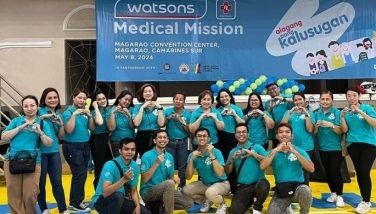Writer’s junk
July 22, 2002 | 12:00am
I love junk. During my gradschool and fellowship years abroad, and even here – in such déclassé bazaars as MSM Surplus in Cubao and HMR Surplus in Pasig – few things brought me more joy and literally cheap thrills than rummaging through piles of someone else’s discards: clothes, shoes, books, cassettes, typewriters, pens (!), computers, bags, photo albums, and knick-knacks.
I’ve dragged home all kinds of finds both precious and capricious, from a rare 1930 Parker Lapis Lazuli Duofold ladies’ pen ($5) to a humongous 1920s dictionary ($1). Last week’s trawlings at MSM were highlighted by an Apple keyboard (P50), and I would’ve carted home the as-is but clean and eminently collectible Mac Portable (Apple’s first laptop, which weighed 16 pounds and sold for $7,300 when it came out in 1991), a steal at P800, if I had the space to spare in the warehouse that passes for the master bedroom.
I guess I get my kicks from both the practical notion of getting something for next to nothing and – less palatably to some fastidious Pinoys – the idea of using something that someone else either couldn’t properly appreciate or graciously parted with. Baguio’s thriving wagwagan or ukay-ukay markets – now apparently taking root in Cubao as well – offer emphatic support for my suspicion that we Filipinos don’t care all that much for newness, except perhaps on Christmases and birthdays. (Indeed, these days we pay a premium for new things that look old – like stonewashed jeans and "antiqued" furniture.)
There is, of course, a certain pathos in old clothes and shoes, a weariness hanging heavily in the air. There’s a story to every necktie or rubber ducky in the place, and the possibility – not too remote – that the "vintage" shirt you’re wearing once imbibed the sweat of a now-dead man could be enough to make your blood curdle. (Better dead, I think, than unseasonably impoverished, the penetrating sadness of which leaves a deeper if invisible stain on objects.)
But the compelling idea here is that things can have second or even third lives in new hands – even more useful and more meaningful lives, if we stretch the metaphor – with pretty cups and plates that were never used now bringing pleasure and a touch of class to a poor family’s table, and ill-appreciated gew-gaws being discovered and elevated to the status of priceless antiques. Myself, I like using rather than just keeping or displaying old things, like old pens or leather briefcases; sure, they’ll get worn out, but wasn’t that what they were made for?
I actually wasn’t thinking of literal junk when I thought of this column. Following through on a mini-lecture I gave my writing workshop last week, I thought I’d remind students and budding writers to embark on something we don’t do enough of: collecting writer’s junk – the odd word, image, sound, name, situation, or character that you encounter on the street or on a jeepney ride, some interesting detail you might not have an immediate use for but which you just know belongs to a story, poem, essay, or play somewhere in your writing future.
Dedicated writers take notes all the time – whether in dog-eared notebooks, crumpled cards, flashy PDAs, or in the infinitely reusable palimpsests (don’t be shy and look it up, now, if you don’t know the word, and you’ll be suitably rewarded) of their minds. You’ll never know when that fabric pattern, that foreign song, that improbable moniker, or that unopened umbrella will come in handy in a piece.
Years ago, such a moment occurred to me as I was walking in downtown Cebu to Carbon market. (I also happen to believe that writers should visit palengkes and get to know the names and faces of fish, and inhale deeply.) I strayed into a sidestreet teeming with vendors of cut flowers, and I looked up from the baby’s breath on the sidewalk to see a dark, fortyish man, bare from the waist up and shiny with sweat, carrying, Charles-Atlas-like, a huge straw basket of blooming red roses above his head. How I wished I had a camera at that instant; what a photograph that would have made, that burden of roses. Having none, I saved the image in my head, determined to use it in a story. As it happened, I did use the idea of a man bearing flowers in a story called "Delivery" – but it had metamorphosed by then into something very different from the original, which is probably how inspiration is supposed to work.
I encourage my students to go off on their own, some lazy Saturday or Sunday, on what you might call treasure hunts or fishing expeditions into the heart of the city (which too few of our young people seem to know these days, away from the malls). Ricky Lee had the right idea in his "trip to Quiapo" metaphor for screenwriting. Quiapo deserves a thorough visit from every writer worth his or her salt. I’d begin with a jeepney ride (no cars or taxis, please) from Quezon City or Makati, getting off at Quiapo Church (where you might get your fortune told or have someone pray on your behalf, for a small fee), then walking to Avenida Rizal via R. Hidalgo, Carriedo, or Raon, then on to Plaza Sta. Cruz, Escolta, and Chinatown, emerging on C. M. Recto (Azcarraga, when I first set foot on it). Spend some time at Arranque Market, a stationary caravan featuring plump exotic chickens, riotous parakeets, and flea-bitten Persian kittens (and, farther up the street, everyone’s stolen cell phone, typically if understandably sold without their chargers). Somewhere along the way, eat – preferably in some nondescript but jampacked hole-in-the-wall with ceiling fans to cool the hototay.
As you walk around, practice sizing up situations and asking yourself "Where’s the story?" or "What’s the story here?" At worst, you’ll end up with a bag of details, a literary pack rat’s delight, that you can dip into on those still, dry days. At best, you’ll come up with a story suggested by the scene at hand.
As with my precious ukay-ukay finds, I never throw these odd details and story snippets away. They all go into a folder in my computer optimistically titled "Ongoing," which some of them have been for 10 years running, but who cares? I cannibalize these portions shamelessly, so that nothing is ever wasted, only saved.
Speaking of computers, don’t look now, but I’ve noticed that the new marble-white "dual-USB" Apple iBook seems to have become the laptop of choice among Filipino writers (those who can afford one of these machines, anyway). Centennial Prize winner and Tsinoy fiction master Charlson Ong is the newest member of the iBook cult, which includes, in no certain order, Hawthornden fellow and children’s story writer Cyan Abad, her papa poet and professor Jimmy Abad, Palanca-winning fictionist and journalist Mia Gonzalez, theater director and playwright Anton Juan, Fulbright fellow Evelina Galang, poet and journalist Pete Lacaba, fictionist and ad man Sarge Lacuesta, fictionist and literary editor Paolo Manalo, NVM Gonzalez awardee Socorro Villanueva, Palanca winner Kimi Tuvera, poet and professor Issy Reyes, columnist Maribel Ongpin, and videographer Nancy Rodrigo (whose columnist husband Raul uses a Titanium PowerBook, like me). Other writers I know who use Apples or Macs include Krip Yuson, Clinton Palanca, Manolo Quezon, Mailin Paterno Locsin, Isabel Mooney, Rayvi Sunico, Rody Vera, Alya Honasan, Jessica Zafra, Janet Villa, and Boojie and Chingbee Basilio. If you’re the kind of person who spends more time thinking about Ernest Hemingway’s fabled No. 2 Mongol pencils or T. S. Eliot’s typewriter than about your plotting or versification – the kind of workman, in other words, to whom the tools count nearly as much as the job itself – this might tell you something.
Send e-mail to Butch Dalisay at penmanila@yahoo.com.
I’ve dragged home all kinds of finds both precious and capricious, from a rare 1930 Parker Lapis Lazuli Duofold ladies’ pen ($5) to a humongous 1920s dictionary ($1). Last week’s trawlings at MSM were highlighted by an Apple keyboard (P50), and I would’ve carted home the as-is but clean and eminently collectible Mac Portable (Apple’s first laptop, which weighed 16 pounds and sold for $7,300 when it came out in 1991), a steal at P800, if I had the space to spare in the warehouse that passes for the master bedroom.
I guess I get my kicks from both the practical notion of getting something for next to nothing and – less palatably to some fastidious Pinoys – the idea of using something that someone else either couldn’t properly appreciate or graciously parted with. Baguio’s thriving wagwagan or ukay-ukay markets – now apparently taking root in Cubao as well – offer emphatic support for my suspicion that we Filipinos don’t care all that much for newness, except perhaps on Christmases and birthdays. (Indeed, these days we pay a premium for new things that look old – like stonewashed jeans and "antiqued" furniture.)
There is, of course, a certain pathos in old clothes and shoes, a weariness hanging heavily in the air. There’s a story to every necktie or rubber ducky in the place, and the possibility – not too remote – that the "vintage" shirt you’re wearing once imbibed the sweat of a now-dead man could be enough to make your blood curdle. (Better dead, I think, than unseasonably impoverished, the penetrating sadness of which leaves a deeper if invisible stain on objects.)
But the compelling idea here is that things can have second or even third lives in new hands – even more useful and more meaningful lives, if we stretch the metaphor – with pretty cups and plates that were never used now bringing pleasure and a touch of class to a poor family’s table, and ill-appreciated gew-gaws being discovered and elevated to the status of priceless antiques. Myself, I like using rather than just keeping or displaying old things, like old pens or leather briefcases; sure, they’ll get worn out, but wasn’t that what they were made for?
I actually wasn’t thinking of literal junk when I thought of this column. Following through on a mini-lecture I gave my writing workshop last week, I thought I’d remind students and budding writers to embark on something we don’t do enough of: collecting writer’s junk – the odd word, image, sound, name, situation, or character that you encounter on the street or on a jeepney ride, some interesting detail you might not have an immediate use for but which you just know belongs to a story, poem, essay, or play somewhere in your writing future.
Dedicated writers take notes all the time – whether in dog-eared notebooks, crumpled cards, flashy PDAs, or in the infinitely reusable palimpsests (don’t be shy and look it up, now, if you don’t know the word, and you’ll be suitably rewarded) of their minds. You’ll never know when that fabric pattern, that foreign song, that improbable moniker, or that unopened umbrella will come in handy in a piece.
Years ago, such a moment occurred to me as I was walking in downtown Cebu to Carbon market. (I also happen to believe that writers should visit palengkes and get to know the names and faces of fish, and inhale deeply.) I strayed into a sidestreet teeming with vendors of cut flowers, and I looked up from the baby’s breath on the sidewalk to see a dark, fortyish man, bare from the waist up and shiny with sweat, carrying, Charles-Atlas-like, a huge straw basket of blooming red roses above his head. How I wished I had a camera at that instant; what a photograph that would have made, that burden of roses. Having none, I saved the image in my head, determined to use it in a story. As it happened, I did use the idea of a man bearing flowers in a story called "Delivery" – but it had metamorphosed by then into something very different from the original, which is probably how inspiration is supposed to work.
I encourage my students to go off on their own, some lazy Saturday or Sunday, on what you might call treasure hunts or fishing expeditions into the heart of the city (which too few of our young people seem to know these days, away from the malls). Ricky Lee had the right idea in his "trip to Quiapo" metaphor for screenwriting. Quiapo deserves a thorough visit from every writer worth his or her salt. I’d begin with a jeepney ride (no cars or taxis, please) from Quezon City or Makati, getting off at Quiapo Church (where you might get your fortune told or have someone pray on your behalf, for a small fee), then walking to Avenida Rizal via R. Hidalgo, Carriedo, or Raon, then on to Plaza Sta. Cruz, Escolta, and Chinatown, emerging on C. M. Recto (Azcarraga, when I first set foot on it). Spend some time at Arranque Market, a stationary caravan featuring plump exotic chickens, riotous parakeets, and flea-bitten Persian kittens (and, farther up the street, everyone’s stolen cell phone, typically if understandably sold without their chargers). Somewhere along the way, eat – preferably in some nondescript but jampacked hole-in-the-wall with ceiling fans to cool the hototay.
As you walk around, practice sizing up situations and asking yourself "Where’s the story?" or "What’s the story here?" At worst, you’ll end up with a bag of details, a literary pack rat’s delight, that you can dip into on those still, dry days. At best, you’ll come up with a story suggested by the scene at hand.
As with my precious ukay-ukay finds, I never throw these odd details and story snippets away. They all go into a folder in my computer optimistically titled "Ongoing," which some of them have been for 10 years running, but who cares? I cannibalize these portions shamelessly, so that nothing is ever wasted, only saved.
BrandSpace Articles
<
>



















